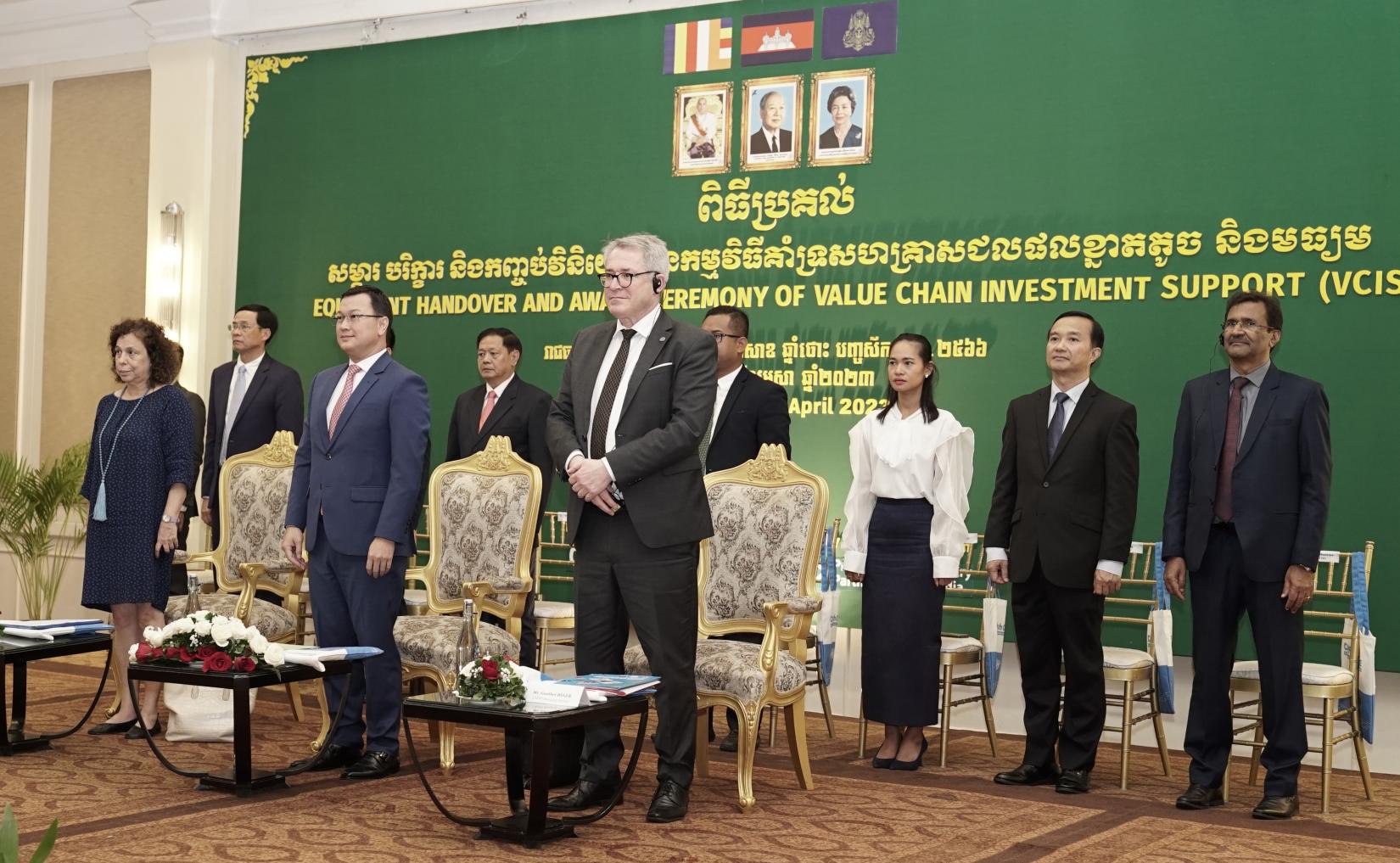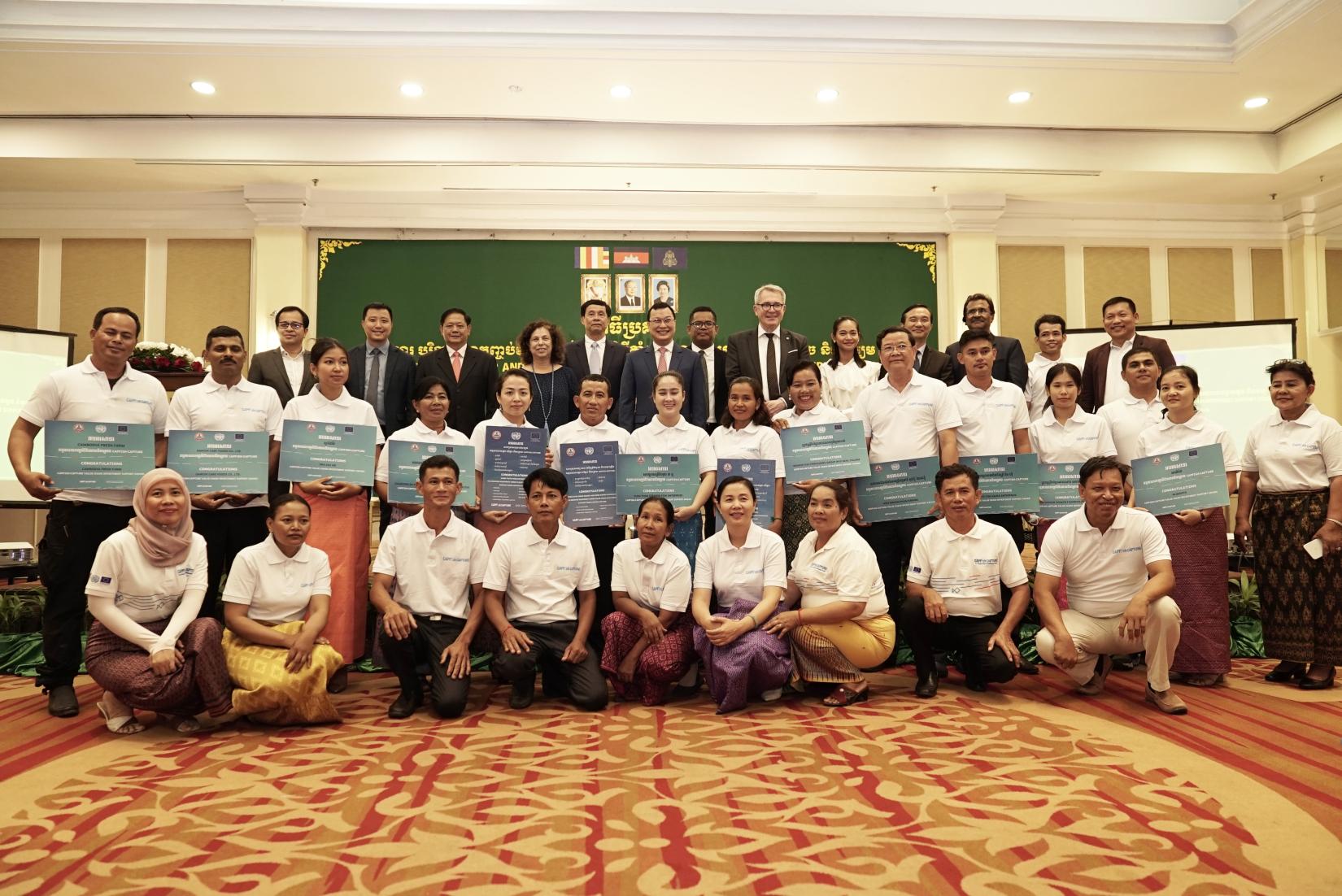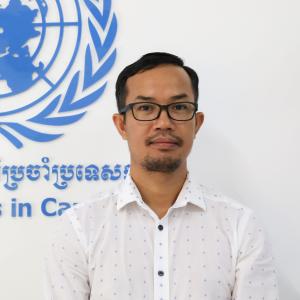Value Chain Investment Support to Enhance Cambodian SMEs’ Competitiveness and Market Access
30 April 2023
Phnom Penh, 28 April 2023 – The Fisheries Administration (FiA) and the United Nations Industrial Development Organization (UNIDO), under the EU-funded CAPFISH programme, handed over to the selected enterprises green and innovative technology, equipment, and materials needed for their more effective and efficient business operations and production, and improved compliance with food safety and environmental requirements.

Solar dryer domes and solar panels are examples of green technologies promoted under Value Chain Investment Support (VCIS), while the equipment and materials include water treatment machines, packing machines, hot air dryer machines, rapid freezers, cold storage facilities, and so on. This handover was also to recognize the enterprises that have completely upgraded their facilities and met the national food safety requirements.
The ceremony was also to award the selected enterprises with VCIS technical assistance on food safety compliance, business and market development, market linkages, and social and environmental management plan. They are ready to implement their business plan, which was approved by the VCIS multi-stakeholder investment committee.
The Equipment Handover and Awards Ceremony is part of the VCIS scheme launched in August 2021. As of now, twenty-eight enterprises in Cambodia’s post-harvest fisheries have been selected for technical and investment support.
As one of the critical interventions under the CAPFISH-Capture project, co-funded by the European Union (EU), VCIS is a co-investment scheme that incentivizes enterprises in Cambodia’s post-harvest fisheries to upgrade their business operations and implement food safety and social and environmental standards. At least 200 fisheries processing enterprises are targeted for the support to improve competitiveness and market access. VCIS will continue to support more qualified enterprises based on their interest and co-investment commitment.
Cambodia’s fisheries value chain is mainly represented by micro and small informal enterprises, which are fragmented and constrained by a lack of access to finance, technologies, markets, and tailored business development technical support. They produce a variety of agri-food and fish and fishery products with inadequate hygienic and food safety practices, hence struggling to compete with both imported products and in global markets.
However, Mr. Gunther Beger, Managing Director of UNIDO’s Directorate for SDG Innovation and Economic Transformation, sees it as an opportunity for the Kingdom. He commented that “through the flagship of the EU-funded CAPFISH programme, this issue gives us a big opportunity to promote green industrialization and build sustainable value chains for poverty reduction and job creation to make the agri-food sector the engine for growth and prosperity in the country.”
Speaking at the ceremony, H.E. Carmen Moreno, Ambassador of the European Union to Cambodia, highlighted the importance of “contributing together to the development of a greener, more competitive and connected economy, and to promoting Cambodian Small- and Medium Enterprises’ integration into ASEAN and global markets. To achieve this goal, compliance with food safety standards, such as certification systems, is essential” and “needed to access any market, and get ready for the most valuables markets, such as the European Union”.
H.E. Dith Tina, Minister of Agriculture, Forestry and Fisheries (MAFF), emphasized the importance of the fisheries sector in Cambodia and appreciated the CAPFISH programme as a strong support from the European Union to the RGC. He commented that “CAPFISH supports are in line with the Royal Government of Cambodia (RGC) policy to promote food safety and access to the international markets and improve the fishery value chain which mainly focuses on upgrading post-harvest fisheries operations and controlling the quality and safety of the fish and fishery products. The event demonstrates the strong partnership between the public, private sector, and development partners working together to make Cambodia’s fish and fishery products more competitive to reach international markets.”
We believe that the success of the VCIS intervention can be replicated for other agricultural commodities rather than just fish and fishery products. “It is in line with the European Union’s commitment to supporting a green economy in Cambodia by focusing on food, agriculture, and forests sector, including the agro-processing industry,” added H.E. Carmen Moreno.

Ends –
For more information, please contact:
- Dr. Chhoun Chamnan, of Department of Fisheries Post-harvest Technologies and Quality Control (DFPTQ) of the Fisheries Administration (FiA): chhounchamnan@gmail.com
- Mr. Samruol IM, National Communication and Visibility Expert for the CAPFISH-Capture project: S.IM@unido.org
- Ms. Pok POUN, Press and Information Officer at the EU Delegation to Cambodia: Pok.POUN@eeas.europa.eu





